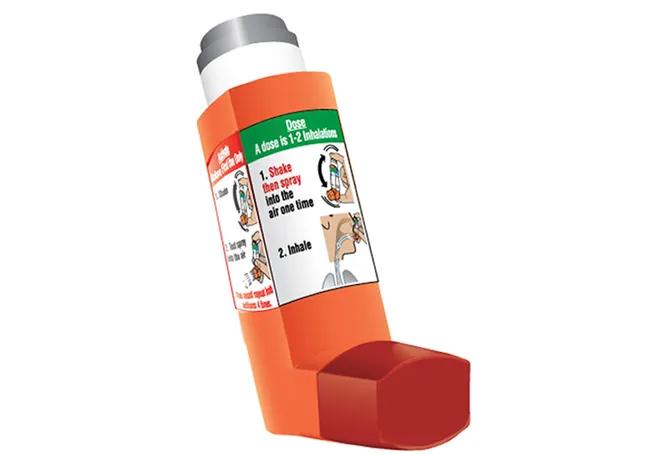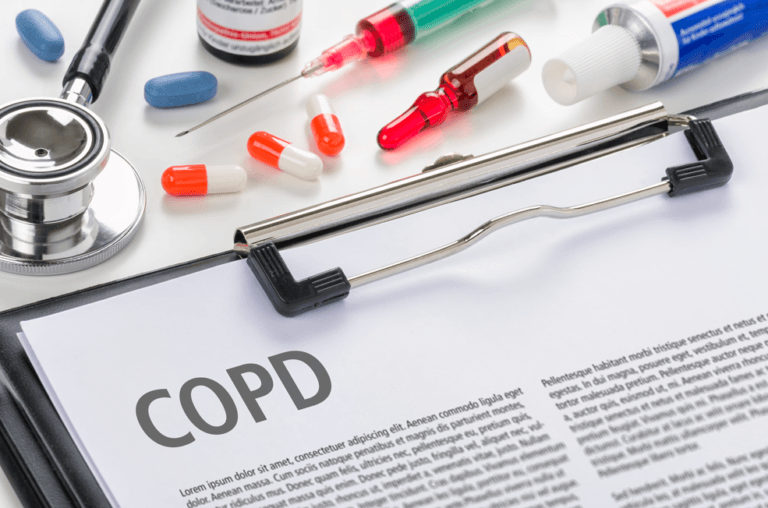Chronic Obstructive Pulmonary Disease (COPD)
Get valuable insights into Chronic Obstructive Pulmonary Disease (COPD), including its causes, symptoms, prevention strategies, and treatment options, while also learning about how you can lower the cost of the medications used to treat Chronic Obstructive Pulmonary Disease (COPD).
MEDICAL INFORMATION
Chronic Obstructive Pulmonary Disease (COPD) Key Facts
Related Medications
Chronic Obstructive Pulmonary Disease (COPD) is a progressive and debilitating respiratory condition that affects millions of people worldwide. Here, we aim to provide you with an in-depth understanding of COPD by exploring its definition, causes, risk factors, pathophysiology, symptoms, diagnosis, treatment options, and management strategies. Additionally, we will delve into the impact of COPD on individuals, communities, and the healthcare system. By examining the latest research and developments in the field, we aim to equip readers with valuable knowledge and promote better COPD management and support for those living with this condition.
Introduction
Chronic Obstructive Pulmonary Disease (COPD) is a progressive respiratory condition characterized by chronic inflammation, airflow limitation, and irreversible lung damage. This essay provides a comprehensive overview of COPD, including its definition, types, causes, risk factors, pathophysiology, symptoms, diagnosis, treatment options, and management strategies.
What is the definition of COPD?
COPD is a chronic and progressive lung disease that includes chronic bronchitis and emphysema. It is primarily characterized by persistent airflow limitation, which is not fully reversible. COPD can be classified into different types based on the predominant pathological features and symptoms.
What is cause of COPD and risk factors?
The main cause of COPD is the long-term exposure to irritants, especially tobacco smoke from cigarette smoking or even secondhand smoke. Other risk factors include exposure to occupational dust and chemicals, indoor and outdoor air pollution, genetic factors, respiratory infections, and certain respiratory conditions during childhood.
What is the pathophysiology of COPD?
COPD involves a complex interplay of factors, including inflammation, oxidative stress, and structural changes in the lungs. Chronic exposure to irritants leads to chronic inflammation, tissue damage, and remodeling of the airways and lung tissue, resulting in the characteristic airflow limitation seen in COPD.
What are the signs and symptoms of COPD?
Common signs of COPD and symptoms include:
- chronic cough
- excessive phlegm
- excessive mucus
- excessive sputum production
- shortness of breath (dyspnea)
- wheezing
- chest tightness
These symptoms progressively worsen over time and significantly impact daily activities and quality of life.
How is COPD diagnosed?
Accurate diagnosis of COPD involves a combination of clinical evaluation, spirometry, chest x-ray, and other breathing tests to assess lung function and exclude other possible causes. Proper diagnosis is crucial for appropriate management and treatment planning.
What are the treatment options for COPD?
The management of COPD aims to relieve symptoms, improve lung function, prevent exacerbations, and enhance overall quality of life. Treatment options for COPD include medications, inhaler devices, oxygen therapy, pulmonary rehabilitation, and in some cases, surgical interventions.
Medications
Medications for COPD management include bronchodilators (short-acting and long-acting) to relax the airway muscles and reduce airflow limitation and inhaled corticosteroids to reduce airway inflammation.
Inhaler Devices
Inhaler devices, such as metered-dose inhalers (MDIs) and dry powder inhalers (DPIs), are commonly used to deliver medications directly to the airways. Proper inhaler technique and device selection are crucial for effective medication delivery.
Oxygen Therapy
Oxygen therapy may be recommended for individuals with severe COPD and low blood oxygen levels. It helps improve oxygenation and relieves symptoms, particularly during exertion or sleep.
Pulmonary Rehabilitation
Pulmonary rehabilitation is a comprehensive program that combines exercise training, education, and support to improve physical fitness, reduce symptoms, and enhance the overall well-being of individuals with COPD.
Surgical Interventions
In some cases, surgical interventions, such as lung volume reduction surgery or lung transplantation, may be considered for selected individuals with severe COPD and significant lung damage.
What are the management and prevention techniques for COPD?
Effective management of COPD involves a multidisciplinary approach that includes lifestyle changes and modifications, breathing techniques, vaccinations, and avoiding environmental triggers.
Lifestyle modifications
Lifestyle modifications such as smoking cessation, regular physical activity, a healthy diet, maintaining a healthy weight, and managing comorbidities are essential components of COPD management.
Breathing techniques
Breathing techniques, such as pursed-lip breathing and diaphragmatic breathing, can help individuals with COPD better control their breathing, reduce breathlessness, and improve exercise tolerance.
Vaccinations
Vaccinations against influenza and pneumococcal infections are strongly recommended for individuals with COPD who are at higher risk of respiratory infections and their complications.
Avoiding environmental triggers
Avoiding exposure to irritants and environmental triggers, such as tobacco smoke, occupational dust, and air pollution is crucial in preventing exacerbations and slowing the progression of COPD.
Impact of COPD
COPD has a profound impact on individuals, communities, and healthcare systems due to its chronic and progressive nature.
Physical impact
COPD significantly impairs lung health and function, resulting in reduced exercise capacity, increased breathlessness, recurrent respiratory infections, and complications such as respiratory failure and cor pulmonale.
Emotional and psychological impact
Living with COPD can cause emotional distress, anxiety, depression, social isolation, and reduced quality of life. Mental health support and interventions are essential components of COPD management.
Social and economic impact
COPD imposes a substantial socioeconomic burden, including increased healthcare utilization, hospitalizations, medication costs, loss of productivity, and decreased workforce participation.
Impact on quality of life
COPD significantly affects an individual’s quality of life, limiting daily activities, social interactions, and overall well-being. Proper management and support can help improve the quality of life for individuals with COPD.
What medications are used in COPD?
Bronchodilators
- Short-acting beta-agonists (SABAs): albuterol, levalbuterol
- Long-acting beta-agonists (LABAs): salmeterol, formoterol, indacaterol, olodaterol, vilanterol
- Short-acting anticholinergics (SAACs): ipratropium bromide
- Long-acting anticholinergics (LAACs): tiotropium bromide, aclidinium bromide, glycopyrrolate, umeclidinium bromide
Combination Bronchodilators
- LABA/LAMA combinations: indacaterol/glycopyrronium, vilanterol/umeclidinium, olodaterol/tiotropium
Inhaled Corticosteroids
- Fluticasone propionate, budesonide
Combination Inhalers (Corticosteroids and Bronchodilators)
- Fluticasone propionate/salmeterol, budesonide/formoterol, fluticasone furoate/vilanterol
Phosphodiesterase-4 (PDE-4) Inhibitor
- Roflumilast
Antibiotics (for COPD exacerbations)
- Azithromycin, amoxicillin, doxycycline
What are COPD exacerbations and complications?
COPD exacerbations, characterized by sudden worsening of symptoms, are common and can be life-threatening. Understanding the triggers, recognizing early signs, and prompt intervention are crucial in managing exacerbations and preventing complications.
Emerging research and development
Ongoing research aims to improve the understanding of COPD pathogenesis, develop new therapeutic targets, enhance diagnostic techniques, and explore novel treatment options. Advances in personalized medicine, biomarkers, and telemedicine hold promise for improved COPD management.
What COPD support organizations are there available to support me in the UK?
- British Lung Foundation (BLF): The British Lung Foundation is a leading charity organization in the UK that provides support and resources for individuals with various lung conditions, including COPD. They offer information materials, helplines, support groups, pulmonary rehabilitation programs, and online communities
- COPD Foundation: The COPD Foundation is a US-based organization that provides resources and support to individuals with COPD worldwide. They offer educational materials, research updates, advocacy initiatives, and community engagement opportunities. Their resources and information are accessible internationally, including in the UK
- Chest, Heart & Stroke Scotland: Chest, Heart & Stroke Scotland is a charity organization that supports individuals with chest, heart, and stroke conditions, including COPD. They offer information resources, support groups, community services, and lifestyle programs to help individuals manage their condition
- British Lung Foundation’s Breathe Easy Groups: The British Lung Foundation’s Breathe Easy Groups are local support groups established by the organization across the UK. These groups provide a platform for individuals with lung conditions, including COPD, to connect, share experiences, and access support in their local communities
What COPD support organizations are there available to support me in the US?
- American Lung Association (ALA): The American Lung Association is a national organization that provides support and resources for individuals with various lung diseases, including COPD. They offer educational materials, pulmonary rehabilitation programs, online support communities, advocacy initiatives, and helplines
- Centers for Disease Control and Prevention
- COPD Foundation: The COPD Foundation is a non-profit organization dedicated to supporting individuals with COPD. They provide educational resources, research updates, online support communities, advocacy initiatives, and programs focused on improving COPD management and quality of life
- National Emphysema Foundation (NEF): The National Emphysema Foundation is an organization that supports individuals with emphysema and COPD. They offer educational materials, support groups, patient advocacy, and resources to help individuals navigate their COPD journey
- Alpha-1 Foundation: The Alpha-1 Foundation is an organization that focuses on supporting individuals with alpha-1 antitrypsin deficiency, a genetic condition that can lead to COPD. They provide resources, educational materials, support groups, research updates, and advocacy initiatives
- Better Breathers Clubs: Better Breathers Clubs are community-based support groups organized by the American Lung Association. These groups provide a platform for individuals with lung diseases, including COPD, to connect, share experiences, and access support in their local communities
- The Global Initiative for Chronic Obstructive Lung Disease (GOLD) works with health care professionals and public health officials
- The American Thoracic Society. Founded in 1905 to combat TB, the ATS has grown to tackle asthma, COPD, lung cancer, sepsis, acute respiratory distress, and sleep apnea, among other diseases
Summary
COPD is a chronic and progressive respiratory disease with a significant impact on individuals and society. By understanding its copd causes, symptoms, diagnosis, treatment options, and management strategies, individuals with COPD can achieve better control, reduced progression of the disease, improved quality of life, and reduced healthcare burden. Continued research, education, and support for those living with COPD are essential to address the challenges posed by this debilitating condition.
Medical Disclaimer
NowPatient has taken all reasonable steps to ensure that all material is factually accurate, complete, and current. However, the knowledge and experience of a qualified healthcare professional should always be sought after instead of using the information on this page. Before taking any drug, you should always speak to your doctor or another qualified healthcare provider.
The information provided here about medications is subject to change and is not meant to include all uses, precautions, warnings, directions, drug interactions, allergic reactions, or negative effects. The absence of warnings or other information for a particular medication does not imply that the medication or medication combination is appropriate for all patients or for all possible purposes.






